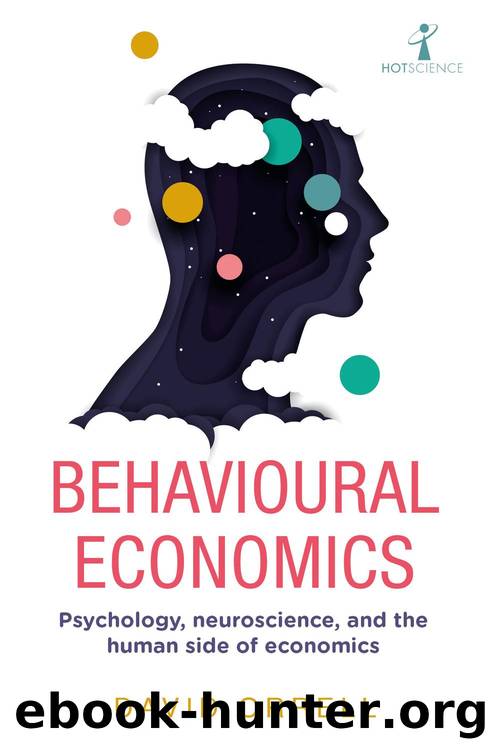Behavioural Economics by David Orrell

Author:David Orrell
Language: eng
Format: epub
Publisher: Icon Books Ltd
Published: 2020-01-15T00:00:00+00:00
Discount plan
As Fisher pointed out, individual time preferences affect many economic decisions. A lack of self-control, for example, may tempt one into âthe saloon on the way home Saturday nightâ (which then was payday) but more generally it plays a role in the outcome of any decision which requires action on our part. And just as cognitive heuristics act as a kind of shortcut which saves mental energy, so self-control involves active work that we may tend to avoid. This is a problem because many of the most important economic decisions â such as investing for retirement, choosing a career, and so on â have outcomes that rely not just on the rational calculation of utility, but also on our ability to follow through with those decisions.
This was famously illustrated by a series of experiments in the 1960s and 1970s, led by psychologist Walter Mischel, in which nursery-age children were offered the choice between one treat (a marshmallow or cookie) immediately, or two if they could wait for a quarter hour while left alone in an empty room. The children employed various diversionary tactics, such as turning around so they couldnât see the tray. Some apparently would âstroke the marshmallow as if it were a tiny stuffed animalâ.
Those children who succeeded in waiting (about a third of the participants) were found, according to a 1990 follow-up paper, to have done better on a range of measures including SAT scores and educational attainment. An attempt to replicate the experiment in 2018 showed that the situation was more complicated, because the ability to delay gratification (and perhaps even trust that a second treat will be forthcoming) was itself linked to socio-economic factors. People from a rougher background may have learned earlier the adage that âa bird in the hand is worth two in the bushâ.
A deeper problem for economic models than the issue of self-control, though, is that time preferences arenât fixed, but themselves change with time. According to standard theory, time preference can be expressed using a discount factor which reflects our degree of patience or impatience. Just as financial markets discount future gains or losses according to the prevailing interest rate, so we discount future utility by some amount which depends on our own personal discount rate.
This discount rate is widely used in economics, often with rather perverse results. For example, the cost of future climate change depends on what discount rate you apply to the utility of having a functioning climate system. Set the discount rate low enough, and preventative action can be made to look too expensive. Similar arguments can be applied to justify procrastination on dealing with future needs of anything from healthcare to social security.
Download
This site does not store any files on its server. We only index and link to content provided by other sites. Please contact the content providers to delete copyright contents if any and email us, we'll remove relevant links or contents immediately.
International Integration of the Brazilian Economy by Elias C. Grivoyannis(106930)
The Radium Girls by Kate Moore(12003)
Turbulence by E. J. Noyes(8007)
Nudge - Improving Decisions about Health, Wealth, and Happiness by Thaler Sunstein(7678)
The Black Swan by Nassim Nicholas Taleb(7087)
Rich Dad Poor Dad by Robert T. Kiyosaki(6576)
Pioneering Portfolio Management by David F. Swensen(6275)
Man-made Catastrophes and Risk Information Concealment by Dmitry Chernov & Didier Sornette(5981)
Zero to One by Peter Thiel(5767)
Secrecy World by Jake Bernstein(4727)
Millionaire: The Philanderer, Gambler, and Duelist Who Invented Modern Finance by Janet Gleeson(4448)
The Age of Surveillance Capitalism by Shoshana Zuboff(4267)
Skin in the Game by Nassim Nicholas Taleb(4224)
The Money Culture by Michael Lewis(4174)
Bullshit Jobs by David Graeber(4162)
Skin in the Game: Hidden Asymmetries in Daily Life by Nassim Nicholas Taleb(3973)
The Dhandho Investor by Mohnish Pabrai(3743)
The Wisdom of Finance by Mihir Desai(3720)
Blockchain Basics by Daniel Drescher(3564)
